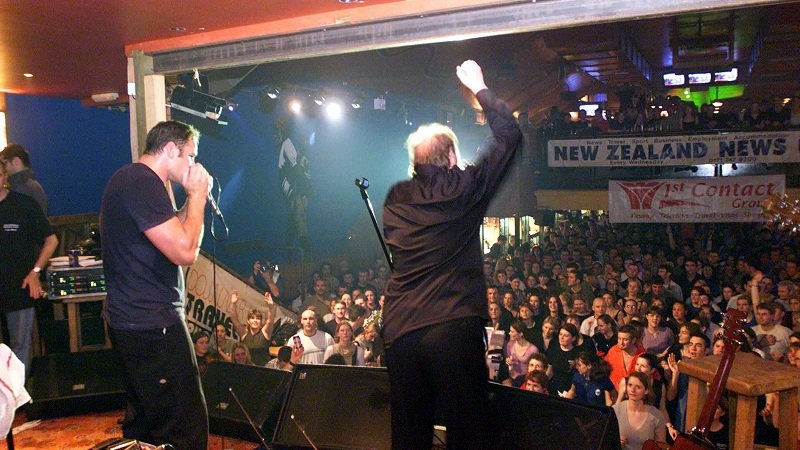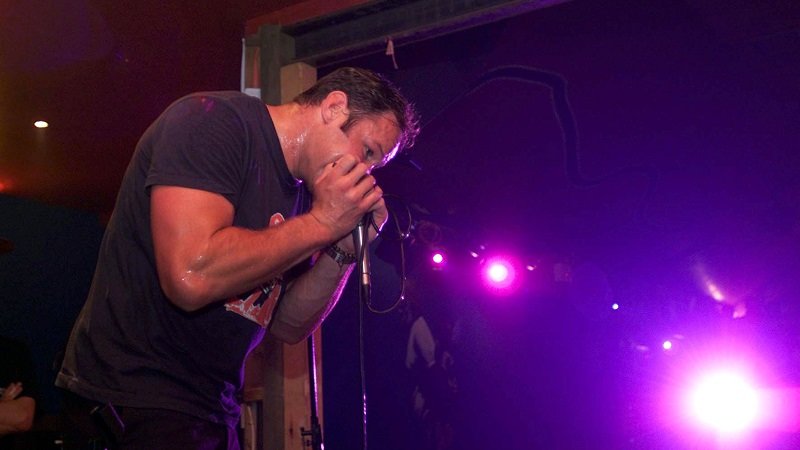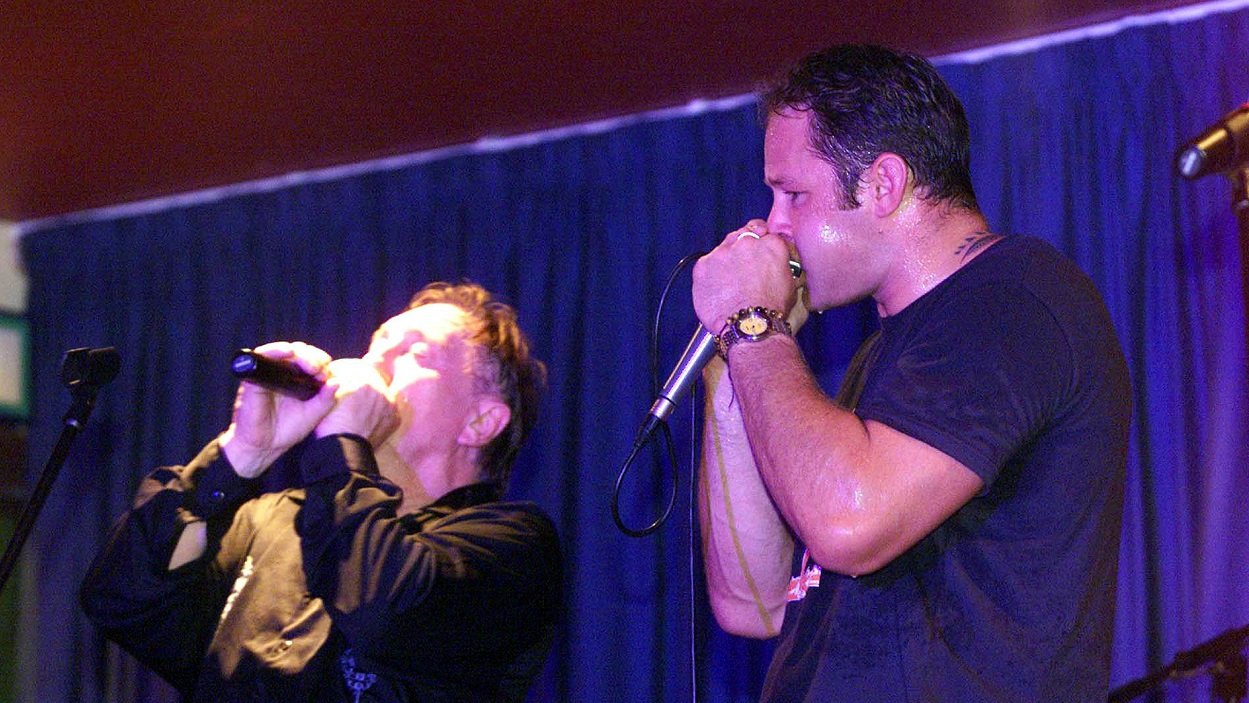The All Blacks Legend That Nearly Gave it All Up to Become a Hard-Living Pro Harmonica Player

Josh Kronfeld is one of the best All Blacks ever, but did he miss his true calling? Don Rowe looks back on the months where the loose forward traded rugby in for a life under stage lights at seedy London venues.
Josh Kronfeld first picked up a harmonica as a P.E student at the University of Otago in 1992. Beautiful and expensive, the harmonica was a gift, and thus went straight to the back of Kronfeld’s top drawer where it would remain for three dark years.
“I never touched it,” he says. “I liked the idea of it though.”
In 1995, the harmonica emerged briefly into the light before being packed away again, this time in Kronfeld’s travel bags. Kronfeld, now a signed All Black, had been picked for the ‘95 cup squad and was headed for South Africa.
“When I went away to the 1995 World Cup I finally thought ‘alright, I’m going to learn to play this thing properly,’” says Kronfeld. “So I took it with me. I used to climb out on the roof when we had down time and practice.”
Like the bagpipes, drums or clarinet, the harmonica is an exquisite instrument in the hands of a master. The emotions in its range run from whimsical, road-trip nostalgia through heartbreaking loneliness and onwards down the full repertoire of the Blues. In the hands of a beginner, though, it’s capable of shrill, piercing, Ring Wraith calls that wouldn’t be out of place in the deep Amazon. Kronfeld was no savant.
“I’d sit out on the roof and play the harp because I was pretty woeful,” says Kronfeld. “There was a guard that used to be stationed on the roof. He would look at me and frown whenever I turned up, because he knew what was coming.”
The All Blacks made the final that year in South Africa, losing to the Springboks in extra time at Johannesburg – a moment which set the stage for Nelson Mandela’s famous cup presentation to Francois Pienaar. The ABs returned to New Zealand with four years ahead of them to rest, recuperate and plan their next campaign. Kronfeld found his way back to Dunedin, and he brought his harp with him.
“When I came back to Dunedin after the World Cup, I had a muso friend I started playing with – just the occasional jam session, stuff like that – and he said ‘look, you need to come down and play with us at some of our gigs’,” says Kronfeld.
“I said ‘Aw, I don’t know if I can do that,’ because I didn’t feel very confident with my harmonica playing at the time. He said ‘Na, na, you could do it, come down and check it out anyway’. So I did, I checked it out, and we ran a lead from the front of the stage all the way to the back. So there I was, sitting in the back of the bar playing harmonica where no one could see me. The band was grooving up front and everyone was looking around trying to figure out where the harmonica was coming from.”
Several gigs later and Kronfeld was an old hand.
“It’s one thing to jam with your mates when you’re having a good time doing it. Sometimes you fuck up, sometimes it’s great. Sometimes you mess up and it actually makes something really cool. But on stage, things are all more set in advance.”
As the 1999 Rugby World Cup approached, Kronfeld had another deadline to keep in mind.
After building a house in Raglan, a small town on New Zealand’s West Coast, Kronfeld developed a relationship with local bluesman Midge Marsden – a touring musician and harmonica fanatic. Over several months and many more bottles of red, Marsden gave Kronfeld an education in the Blues.
“I started hanging out with Midge and all his crew and he was a whole different swing from what I had been doing because he was super passionate about the Blues and where it came from,” says Kronfeld.
“He had this CD library, nobody has one like it anymore, and he’d say ‘Oh you’ve gotta check this out,’ and then he’d find another version of the same song and then he’d have about four different versions from four different artists and they were all mindblowing, and then he’d go on to another. So I took these massive historical journeys regarding a particular song that I’d asked about or something that he’d done. Midge travelled all over the US and the world living like a bluesman. He’s one of the few people, as a white guy, who’s gone and lived the world of the harmonica player. Midge is recognised as an old Blues master in the United States and that’s a pretty massive accolade.”
During one of these booze-fuelled musical/historical expositions, the pair planned for a reunion in London, where Kronfeld would join Midge and band for a ten day tour. Unlike most plans made in such conditions, the pair made good, and were on the road shortly after the All Blacks’ crippling defeat at the hands of the French.
“We sorted this gig in Shepherd’s Bush and it was massive,” says Kronfeld “It was pretty mind-blowing, 3000 plus people, standing there in a two-story place. It was just psycho. It was full fledged rock n’ roll. The crowd were just buzzing and you couldn’t move at all.”

In the aftermath of the world cup, London, ever a hotbed of Kiwi ex-pats, was particularly infested. Kronfeld and company played to packed audiences in a whirlwind tour of some of the city’s seediest venues, the perfect place to play the Blues.
“It was amazing. It was full on rock ‘n roll, I’ve never seen so many drunk people. A whole lot of Kiwis just losing the plot at a kiwi gig in the middle of the UK. It was just fantastic. We were finishing at like 3 or 4 in the morning and nobody was getting up till the late afternoon, and then we’d get on the train in big duffel coats on the tube with dark glasses looking like the day walkers. It was hilarious.”
Kronfeld and Marsden would both return to New Zealand, reuniting for a show in unlikely Dunedin student bar The Gardens Tavern. Playing alongside a local punk group, the pair were eventually embroiled in a three-way harmonica battle, a highlight moment in Kronfeld’s musical career.
“It was the nuttiest thing I’ve ever heard,” he says. “It was just heaving. Absolutely heaving. There were people falling out the windows even, and just loving it. Here was Midge Marsden, who’s an NZ icon, jamming with these young punks, and there was me there with the whole ‘All Black’ thing on top of that. It was a nutty night.”
But Kronfeld soon discovered life of a rock ‘n roll musician didn’t mesh with that of a professional athlete. More than one Friday night gig was sacrificed on the altar of footy, and Kronfeld’s after-match routine eventually boiled down to escaping Carisbrook Stadium as quickly as possible and maybe catching the tail end of a gig in town.
“Rugby got in the way of the harp,” laughs Kronfeld. “But don’t get me wrong, there’s nothing better than playing live music. If I could pick my dream job – if I could be what I was in rugby, in rock – aw man, I would do it tomorrow. There’s no greater high than live music.”

The defeat in 1999 was Kronfeld’s final World Cup. In 2003, after a short stint playing club rugby in England, Kronfeld returned to New Zealand and hung up the boots for good. His harp wasn’t far behind.
“I can still crank out a tune occasionally but I’m getting further and further away from wanting to do that,” he says “I love really nice music and I don’t want to be putting my crap on someone’s good stuff just because I’m Josh Kronfeld, does that make sense?
Plus, I could be surfing instead.”













































































